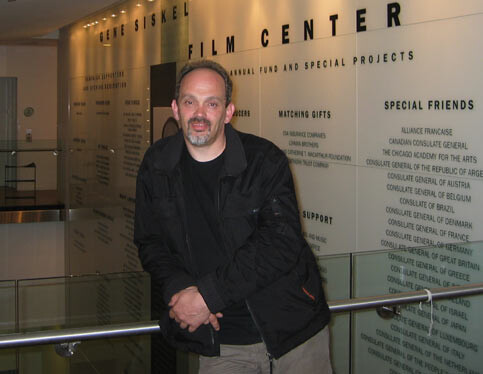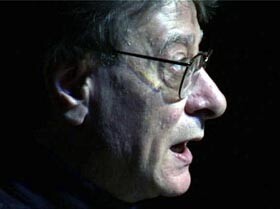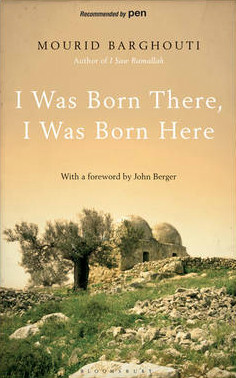The Electronic Intifada 21 June 2004

Director Samir Abdallah at Chicago’s Gene Siskel Film Center (Photo: Chris Khoury)
“People who have been [to the West Bank and Gaza Strip] always say it’s very difficult … to speak about it” to others who haven’t been there, says French director Samir Abdallah, creator of the film Writers on the Borders: A Journey to Palestine(s). Abdallah adds that his film “brings some proposal to this question of how to speak about it and show what’s happening in Palestine and … [informs how to] not only be a storyteller but an actor, in an active position” in striving for justice for the Palestinians.
Through his films (he’s made five films on the Palestinians), Abdallah wants the world to see how to become involved in solidarity with the Palestinians. And he is co-founder of an organization called the Civil International Campaign for the Protection of the Palestinian People, which aims to send internationals to Palestine, and “to go on the ground and to have [internationals] witnessing of what’s happening, participate in direct solidarity, spread in the world information about the occupation,” and pressure politicians to change their policy towards the Palestinians.
It was because he has produced several films about delegations of internationals in the Palestinian territories that Abdallah was contacted by the International Parliament of Writers (IPW) to film, along with José Reynes, Writers on the Borders. Documenting a delegation of internationally renowned writers from all the continents who visit the West Bank and Gaza Strip, the film not only shows viewers a glimpse of what life is like for occupied Palestinians, but it also portrays the writers’ shock in reaction to what is happening in the territories. In the film, the writers meet with their Palestinian peers, including the “leader of modern poetry,” as Abdallah puts it, Palestinian poet Mahmoud Darwish.
Created in 1994, Abdallah says the IPW aims to “gather writers from all over the world, especially giving opportunities to writers who are living in countries where they are persecuted,” acting as a sort of “solidarity of writers.” Russell Banks, the American writer included in the film, serves as the Parliament’s president, and Darwish is one of the founders. Because Darwish was unable to attend the Parliament’s meetings in Europe and the U.S., “the writers decided to go to him,” says Abdallah.
He adds that the writers “made a call for peace in Palestine,” and for an “international force to protect the Palestinian government from Israeli occupation.” The delegation to Palestine was formed with a sense of urgency, and Abdallah was contacted two weeks before their arrival in the West Bank to capture their travels on film. Explaining that French T.V. was uninterested in giving them production support, Abdallah says that he and Reynes shot the film with just “two digital cameras, and our will to go and do this work.”

Mahmoud Darwish in Writers on the Borders
Of the Israeli soldiers who control the movement of Palestinians and journalists alike, Abdallah says, “They consider themselves as kind of idols of democracy in an ocean of barbarism. So of course they want to show themselves as democratic, [touting] freedom of the press, and freedom of anything, and taking pictures, but at the same time they know that the power of the pictures can be very bad for them.”
Noting that generally there is no shortage of photography coming out of Palestine, Abdallah adds, “Another thing that can explain why many pictures have been taken by many cameras in Palestine by journalists of all kind, is because the Israelis believe, many of them, that what they are doing is just — they don’t see the danger of these kinds of pictures. It’s so arrogant; they believe they are so strong, they believe they are right to do [have power over the Palestinians]. … The problem is that journalists’ pictures are never seen because there is self-censorship. Many media don’t show 1 percent [of what is captured on film] because any time you show a picture that leads to criticism of Israel, it leads to that accusation that if you criticize Israel you are [anti-Semitic].”
Indeed, the writers in the delegation that Abdallah filmed were accused of anti-Semitism and found their books pulled off of library shelves in Israel and Europe alike. One comment by Portuguese writer José Saramago in particular caused a storm of controversy. Observing the barricaded hilltop Jewish settlement of Psegot, whose bright security lights beamed down upon the Ramallah refugee camp the writers were visiting, Saramago compared the occupied city of Ramallah to Auschwitz. Not only did the comment upset many in Israel, but Abdallah says it was divisive amongst the writers, some finding it counterproductive.
After shooting Writers, Abdallah says he lived with a group of internationals for a month in the besieged compound of Yasser Arafat, and made a film called Siege that documented the period. His first film on the Palestinians, We Will Return One Day, was shot in Lebanon and focused on Palestinian refugees 50 years after al-Nakba (the catastrophe). Now Abdallah’s goal is to get the films widely distributed to not only “show the tragedy that’s happening every day,” but to also demonstrate how people can become involved in solidarity movements.
Abdallah, who is of Egyptian heritage, though his family has a branch in Gaza, believes that what’s happening in Gaza and the West Bank is not without consequence to his daily life in France. Connecting the Palestinian struggle to other struggles against imperialism all over the world, Abdallah says, “Israel is exporting its ideology and technology of security and domination, and … the experience of domination to the other parts of the world. Israelis are number one in security applications. There are direct links between our struggle in Europe and other parts the world against oppression and what’s happening in Palestine. It’s not just that we have solidarity with the victims. No, we’re in solidarity with people who are fighting for the same aim that we are.”
Maureen Clare Murphy, a recent graduate from the School of the Art Institue of Chicago, is Arts, Music, and Culture Editor for EI
For more information
“Writers on the Borders: A Journey to Palestine(s)” by Samir Abdallah and José Reynes
©L’Yeux Ouverts/Cyclope, 2004
DVD available in September 2004
& “The Siege” by Samir Abdallah
©L’Yeux Ouverts/Factory, 2003
Related links




